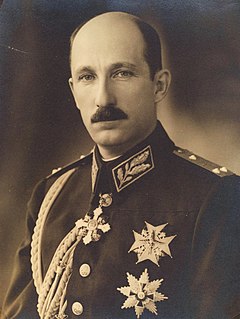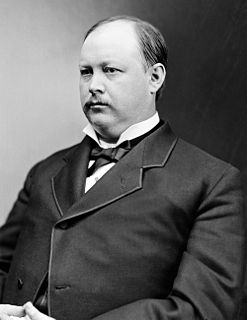
Boris III, originally Boris Klemens Robert Maria Pius Ludwig Stanislaus Xaver, was Tsar of Bulgaria from 1918 until his death.

Simeon II of Bulgaria is the last reigning Bulgarian monarch and later served as Prime Minister of Bulgaria from 2001 to 2005.

The Bulgarian Socialist Party, known as the Centenarian, is a social-democratic political party in Bulgaria and the successor to the Bulgarian Communist Party. It is a member of the Party of European Socialists with a pro-EU stance, although it has taken some euroskeptic positions and called for an end to EU sanctions against Russia. BSP is also a member of the Socialist International. It is Bulgaria's largest political party by membership.

Prince Kyril of Bulgaria, Prince of Preslav was the second son of Ferdinand I of Bulgaria and his first wife Marie Louise of Bourbon-Parma. He was a younger brother of Boris III of Bulgaria and a prince regent of the Kingdom of Bulgaria from 1943 to 1944.

The Union of Democratic Forces is a political party in Bulgaria, founded in 1989 as a union of several political organizations in opposition to the communist government. The Union was transformed into a single unified party with the same name. The SDS is a member of the European People's Party (EPP). In the 1990s the party had the largest membership in the country, with one million members, but has since splintered into a number of small parties totaling no more than 40,000 members. The SDS proper had 12,000 members in 2016.

Bulgaria elects on national level a head of state - the president - and a legislature. The president is elected for a five-year term directly by the people. The National Assembly has 240 members, elected for a four-year term by proportional representation in multi-seat constituencies with a 4% threshold. Bulgaria has a multi-party system, in which no one party often has a chance of gaining power alone, and parties must work with each to form governments.

Elections to the United States House of Representatives were held in 1896 for members of the 55th Congress, coinciding with the election of President William McKinley.

Elections to the United States House of Representatives in 1894 comprised a significant realigning election — a major Republican landslide that set the stage for the decisive election of 1896. The elections of members of the United States House of Representatives in 1894 came in the middle of President Grover Cleveland's second term. The nation was in its deepest economic depression ever following the Panic of 1893, so economic issues were at the forefront. In the spring, a major coal strike damaged the economy of the Midwest and Mid-Atlantic. It was accompanied by violence; the miners lost and many moved toward the Populist party. Immediately after the coal strike concluded, Eugene V. Debs led a nationwide railroad strike, called the Pullman Strike. It shut down the nation's transportation system west of Detroit for weeks, until President Cleveland's use of federal troops ended the strike. Debs went to prison. Illinois's Governor John Peter Altgeld, a Democrat, broke bitterly with Cleveland.
The Party of Bulgarian Social Democrats is a social-democratic political party in Bulgaria. It is a member of the Socialist International and the Party of European Socialists.

GERB is a conservative, populist Bulgarian political party established on 13 March 2006. The initials of the party герб/gerb also translate as "coat of arms" in Bulgarian. It is Bulgaria's second-largest party by membership.

The People's Liberal Party was a political party in Bulgaria.

The Liberal Party was a political party in Bulgaria and the main force in domestic politics between independence in 1878 and the mid-1880s when it dissolved into several different factions.

The Progressive Liberal Party was a political party in Bulgaria.

The Liberal Party, also known as the Radoslavists was a political party in Bulgaria from 1887 until 1920.
The People's Party was a political party in Bulgaria between 1894 and 1920.
The Reformist Bloc was a centre-right electoral alliance in Bulgaria.

Parliamentary elections were held in Bulgaria on 5 October 2014 to elect the 43rd National Assembly. GERB remained the largest party, winning 84 of the 240 seats with around a third of the vote. A total of eight parties won seats, the first time since the beginning of democratic elections in 1990 that more than seven parties entered parliament. Boyko Borisov then became prime minister as head of a coalition with the Reformist Bloc and with outside support from the Patriotic Front and the Alternative for Bulgarian Revival.

Presidential elections were held in Bulgaria on 6 November 2016, alongside a referendum on changes to the electoral system and political party funding. The second round was held on 13 November 2016, resulting in the victory of Rumen Radev.
Presidential elections are scheduled to be held in Bulgaria in 2021, although they may be held earlier if the office of President become vacated as a result of death, resignation or removal from office. The incumbent president, Rumen Radev, is eligible for re-election.











